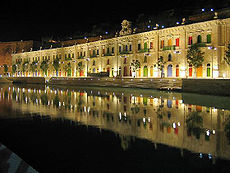
Tourism in Malta
Encyclopedia
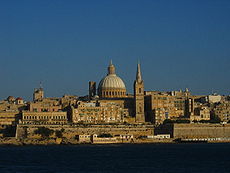
Economy of Malta
The strengths of the Economy of Malta are its limestone, a favourable geographic location, and a productive labour force. Malta produces only about 20% of its food needs, has limited freshwater supplies, and has no domestic energy sources. The economy is dependent on foreign trade, manufacturing ,...
, contributing about 15 per cent of the nation's gross domestic product
Gross domestic product
Gross domestic product refers to the market value of all final goods and services produced within a country in a given period. GDP per capita is often considered an indicator of a country's standard of living....
(GDP). It is overseen by the Malta Tourism Authority, which in turn falls under the responsibility of the Parliamentary Secretariat for Tourism, the Environment and Culture. Malta features a number of tourism attractions encompassing elements of the island's rich history and culture, as well as aquatic activities associated with the Mediterranean Sea
Mediterranean Sea
The Mediterranean Sea is a sea connected to the Atlantic Ocean surrounded by the Mediterranean region and almost completely enclosed by land: on the north by Anatolia and Europe, on the south by North Africa, and on the east by the Levant...
. In addition, medical tourism
Medical tourism
Medical tourism is a term initially coined by travel agencies and the mass media to describe the rapidly-growing practice of travelling across international borders to obtain health care...
has become popular in Malta in recent years, especially since government efforts to market the practice to medical tourists in the United Kingdom.
The number of people who visited Malta in 2009 dropped considerably compared to the figures for 2008 - overall, the country's tourism industry suffered an 8 per cent drop from 2008. Visits from non-European Union
European Union
The European Union is an economic and political union of 27 independent member states which are located primarily in Europe. The EU traces its origins from the European Coal and Steel Community and the European Economic Community , formed by six countries in 1958...
countries dropped more considerably than visits from European Union countries (and even more so than visits from Eurozone
Eurozone
The eurozone , officially called the euro area, is an economic and monetary union of seventeen European Union member states that have adopted the euro as their common currency and sole legal tender...
countries), while the average stay length remained the same for both 2008 and 2009. Visitors from most countries require a visa to visit Malta. The nationalities requiring a visa are standardised as per European Union rules. Visitors already holding a valid Schengen Area
Schengen Area
The Schengen Area comprises the territories of twenty-five European countries that have implemented the Schengen Agreement signed in the town of Schengen, Luxembourg, in 1985...
visa most likely will not need to complete any more formalities to enter Malta (so long as they are already inside the Schengen Area). Visitors holding citizenship of the European Union
Citizenship of the European Union
Citizenship of the European Union was introduced by the Maastricht Treaty . European citizenship is supplementary to national citizenship and affords rights such as the right to vote in European elections, the right to free movement and the right to consular protection from other EU states'...
do not require a visa to enter Malta as they hold the right to free movement within the European Union. In recent years, the country's tourism industry has been faced with a number of issues relating to the nation's small size, both in terms of area and population. These issues include stretched resources and infrastructure (such as water, waste management, beaches and roads), especially during the summer months of July and August.
Attractions
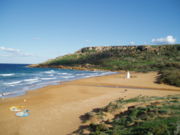
Roman Empire
The Roman Empire was the post-Republican period of the ancient Roman civilization, characterised by an autocratic form of government and large territorial holdings in Europe and around the Mediterranean....
and the Byzantines
Byzantine Empire
The Byzantine Empire was the Eastern Roman Empire during the periods of Late Antiquity and the Middle Ages, centred on the capital of Constantinople. Known simply as the Roman Empire or Romania to its inhabitants and neighbours, the Empire was the direct continuation of the Ancient Roman State...
have all occupied Malta at some point in history, leaving a mix of many different architectural styles and artifacts to explore. The sovereignty of the Knights Hospitaller
Knights Hospitaller
The Sovereign Military Hospitaller Order of Saint John of Jerusalem of Rhodes and of Malta , also known as the Sovereign Military Order of Malta , Order of Malta or Knights of Malta, is a Roman Catholic lay religious order, traditionally of military, chivalrous, noble nature. It is the world's...
over Malta from 1530 to 1798 resulted in a legacy of elaborate artistry and architecture throughout Malta. The country's modern museums and art galleries feature relics from Malta's history for tourists and Maltese residents alike to enjoy.
There are also a number of aquatic activities to enjoy on Malta as well as Gozo
Gozo
Gozo is a small island of the Maltese archipelago in the Mediterranean Sea. The island is part of the Southern European country of Malta; after the island of Malta itself, it is the second-largest island in the archipelago...
and Comino
Comino
Comino is an island of the Maltese archipelago between the islands of Malta and Gozo in the Mediterranean Sea, measuring in area. Named after the cumin seed that once flourished in the Maltese islands, Comino is noted for its tranquility and isolation. It has a permanent population of only four...
. Northern Malta is home to the country's beach resorts and holiday areas, with the beaches most popular with holiday-makers being Mellieha Bay, Ghajn Tuffieha and Golden Bay. These beaches are large enough to be able to house cafes, restaurants and kiosks, but small enough to be crowded rarely. Malta's northwest is home to the island's quietest beaches, and it is on these that the main island's neighbouring two are nearest. Gozo and Comino are also popular beach spots for holiday-makers, although these are much more likely to be quieter, rockier and more suitable for snorkelling. The Mediterranean Sea
Mediterranean Sea
The Mediterranean Sea is a sea connected to the Atlantic Ocean surrounded by the Mediterranean region and almost completely enclosed by land: on the north by Anatolia and Europe, on the south by North Africa, and on the east by the Levant...
surrounding Malta is popular for diving - while shallow dips may be attractive to beginning divers, more experienced divers may be able to dive deeper to find historical artifacts from World War II
World War II
World War II, or the Second World War , was a global conflict lasting from 1939 to 1945, involving most of the world's nations—including all of the great powers—eventually forming two opposing military alliances: the Allies and the Axis...
or earlier.
Major event tourism
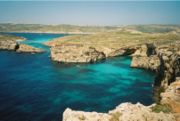
Holy Week
Holy Week in Christianity is the last week of Lent and the week before Easter...
, processions and religious services dominate the country, and food stalls are set up in the village squares of Malta. Another popular major event is Carnival
Maltese Carnival
Carnival has had an important place on the Maltese cultural calendar for just under five centuries, having been introduced to the Islands by Grand Master Piero de Ponte in 1535...
, a five centuries-old traditional celebration lasting for the five days preceding Ash Wednesday
Ash Wednesday
Ash Wednesday, in the calendar of Western Christianity, is the first day of Lent and occurs 46 days before Easter. It is a moveable fast, falling on a different date each year because it is dependent on the date of Easter...
. Celebrations for Carnival involve float-based pageants, street parties and street food stalls. They are moslty Roman Catholic.
One of the biggest sporting events held on the island is the Malta Marathon. Held every year in late February or early March, the race attracts a number of international competitors and has been sponsored by Land Rover
Land Rover
Land Rover is a British car manufacturer with its headquarters in Gaydon, Warwickshire, United Kingdom which specialises in four-wheel-drive vehicles. It is owned by the Indian company Tata Motors, forming part of their Jaguar Land Rover group...
since 2009, BMW
BMW
Bayerische Motoren Werke AG is a German automobile, motorcycle and engine manufacturing company founded in 1916. It also owns and produces the Mini marque, and is the parent company of Rolls-Royce Motor Cars. BMW produces motorcycles under BMW Motorrad and Husqvarna brands...
from 2003 to 2008, GoMobile in 2002 and Flora Malta in 2001 and prior. In 2009, the full marathon winner, a Belgian, recorded a time of 2:25:59. In 2010, approximately 1,400 entrants participated.
Medical tourism
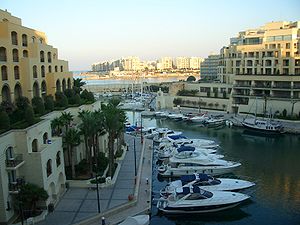
Medical tourism
Medical tourism is a term initially coined by travel agencies and the mass media to describe the rapidly-growing practice of travelling across international borders to obtain health care...
destination. Focus areas for medical tourism include "cosmetic surgery, orthopedics
Orthopedics
Orthopedics is the study of the musculoskeletal system. The Greek word 'ortho' means straight or correct and 'pedics' comes from the Greek 'pais' meaning children. For many centuries, orthopedists have been involved in the treatment of crippled children...
, opthalmic
Ophthalmology
Ophthalmology is the branch of medicine that deals with the anatomy, physiology and diseases of the eye. An ophthalmologist is a specialist in medical and surgical eye problems...
, neurological
Neurology
Neurology is a medical specialty dealing with disorders of the nervous system. Specifically, it deals with the diagnosis and treatment of all categories of disease involving the central, peripheral, and autonomic nervous systems, including their coverings, blood vessels, and all effector tissue,...
, urological
Urology
Urology is the medical and surgical specialty that focuses on the urinary tracts of males and females, and on the reproductive system of males. Medical professionals specializing in the field of urology are called urologists and are trained to diagnose, treat, and manage patients with urological...
, oncology
Oncology
Oncology is a branch of medicine that deals with cancer...
, diagnostic, bariatric
Bariatrics
Bariatrics is the branch of medicine that deals with the causes, prevention, and treatment of obesity. The term bariatrics was created around 1965, from the Greek root bar- , suffix -iatr , and suffix -ic...
and cardiac services." The focus target market for medical tourists in Malta is the United Kingdom, followed by North Africa, the Middle East, Russia and North America. Part of the reason for targeting the United Kingdom for medical tourists is that many members of Malta's medical profession were trained in the United Kingdom, increasing the confidence of British patients in those taking care of them. In addition, unlike some medical tourism destinations, Malta has a stable political climate. The Maltese
Government of Malta
The Government of Malta is the executive branch of Malta. It is made up of the Cabinet and the Parliamentary Secretaries. The Prime Minister is appointed by the President of Malta, with the President making his or her decision based on the situation within the Maltese parliament. The Prime...
government supports the development of medical tourism on the island but believes that private medical providers should be performing medical procedures, not government-run facilities.
Visas
In addition to a valid passport, "documents substantiating the purpose and the conditions of the planned visit" and "sufficient means of support, both for the period of the planned visit and to return to their country of origin," travellers arriving in Malta may be required to have a visa for entry into the country.European Union
Citizenship of the European Union
Citizenship of the European Union was introduced by the Maastricht Treaty . European citizenship is supplementary to national citizenship and affords rights such as the right to vote in European elections, the right to free movement and the right to consular protection from other EU states'...
citizens have the right to travel freely into Malta without completing any special formalities. The nationals of many countries are not required to hold visas to enter Malta, although many are in accordance with uniform European Union regulations. A full list of nationalities required to hold visas to enter Malta and the Schengen Area
Schengen Area
The Schengen Area comprises the territories of twenty-five European countries that have implemented the Schengen Agreement signed in the town of Schengen, Luxembourg, in 1985...
is published on the Ministry of Foreign Affairs' web site.
While Malta cannot unilaterally drop the requirement for nations it makes agreements with to obtain visas to enter the Schengen Area through its border crossing points, it is permitted to offer visa discounts to certain nationalities. At present, Malta has 'visa facilitation agreements' with eight nations: Albania, Bosnia and Herzegovina, Moldova, Macedonia, Russia, Serbia and Ukraine.
Statistics
Tourism is a major component of the Maltese economy, constituting about 40 per cent of Malta's GDP in 2003/04. 1,183,012 tourists visited Malta in 2009. Although this is an 8 per cent drop from 2008, the number of tourists is expected to reach 1,300,000 by the end of 2010 (figures are not yet available). For the period January to December 2009, drops were recorded in visits from most countries sending large numbers of tourists to Malta, including Belgium, France, Germany, Ireland, the Netherlands, Russia, the Scandinavian countries, Spain, the United Kingdom and the United States, whilst a 24.7 per cent increase was recorded in visits from and Libya. Visits from non-European UnionEuropean Union
The European Union is an economic and political union of 27 independent member states which are located primarily in Europe. The EU traces its origins from the European Coal and Steel Community and the European Economic Community , formed by six countries in 1958...
countries took the greatest hit, with visits from these countries decreasing by 15 per cent compared to 2008. Comparatively, visits from European Union countries decreased only 7.4 per cent. Visits from the Eurozone
Eurozone
The eurozone , officially called the euro area, is an economic and monetary union of seventeen European Union member states that have adopted the euro as their common currency and sole legal tender...
dropped by an even smaller proportion, recording a fall of only 5.6 per cent.
The vast majority of visitors to Malta stayed for seven nights or longer, with the average stay length being 8.5 nights. While the number of people staying seven nights or longer in Malta fell by 13.4 per cent in 2009 compared to 2008, the number of people staying four to six nights jumped 7.5 per cent, and one to three nights by 1.5 per cent. Expenditure by tourists to Malta declined 12 per cent when compared to 2008 levels, with a recorded value of EUR
Euro
The euro is the official currency of the eurozone: 17 of the 27 member states of the European Union. It is also the currency used by the Institutions of the European Union. The eurozone consists of Austria, Belgium, Cyprus, Estonia, Finland, France, Germany, Greece, Ireland, Italy, Luxembourg,...
916.4 million.
Historical trends
Tourism in Malta began to grow beginning in the mid-1960s. During the 1970s, Maltese tourism grew significantly, with numbers growing from 170,800 in 1970 to 705,500 in 1981. From 1981, the figures dropped to approximately 500,000 visitors per year until the late 1980s, when an upward trend began again. In the mid 1990s, figures were as high as 1.2 million tourists per year.The volatility of the Maltese tourism market in the past has been largely due to trends in the preferences of tourists from the United Kingdom, who comprise Malta's largest tourism market. Although Malta's uniform use of English, its traditional ties to the United Kingdom and low-cost travel options have made it an attractive option to British tourists, changing preferences of these tourists can impact Malta's tourism income quite significantly. For example, the increasing preference of British tourists for Spanish destinations during the 1980s was reflected in a drop in Malta's tourism numbers during that period.
Market issues
